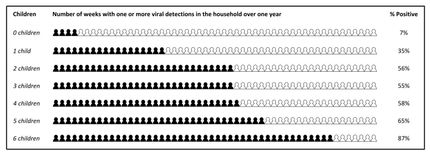Contagious equine flu virus infecting dogs across U.S. is isolated by Cornell researchers
Advertisement
A Cornell University virologist has isolated a highly contagious equine flu virus that is spreading a sometimes-fatal respiratory flu among dogs, and is responsible for a major dog-flu outbreak in New York state. There is no evidence that the virus could infect people. According to a paper published in the Sept. 26 issue of Science Express (Vol. 309, No. 5743), this is the first time an equine flu virus has been found to jump species.
The equine influenza virus, H3N8, was isolated at Cornell's College of Veterinary Medicine after University of Florida researchers sent fluid and tissue samples from greyhound race dogs that had died from a respiratory illness at a Florida racetrack in January 2004.
"Of all animals, dogs have the most intimate contact with humans on a daily basis, so the potential for human infection has to be in the back of our minds," said Ed Dubovi, director of the virology center at Cornell's Animal Health Diagnostic Laboratory, who isolated the virus from the University of Florida samples. Still, he added, there is no evidence of the virus jumping to humans, and there is no expectation of it doing so. It is possible the equine virus has been infecting dogs for some time, although the symptoms are very similar and could be mistaken for common "kennel cough," a bacterial disease related to pertussis (whooping cough) in children. Nevertheless, the paper cautions that the newly discovered flu virus must be closely monitored.
With close to 100 percent of dogs exposed to the virus becoming infected and about 80 percent of infected dogs showing symptoms, the flu could be spreading throughout the country. It was originally documented in greyhounds at tracks and kennels but now is infecting all breeds of dogs. Ongoing testing is being done to track the spread of the virus to different regions of the country.
The Centers for Disease Control and Prevention (CDC) in Atlanta sequenced the virus' entire genome and found all the segments were from the equine virus. This is unusual, because flu viruses will often swap genetic material with other flu viruses when they jump species. For a new virus to enter another species it must overcome a number of barriers, such as finding a cell receptor to bind to in order to enter the cell and to reproduce sufficiently in the new host.
When Dubovi first received the University of Florida samples, he and his colleagues isolated a virus and determined that it was an influenza not typically found in dogs. The next step was to test to see if it was an avian flu virus, like the virulent H5N1 that has jumped from birds to humans over the last few years. PCR (polymerase chain reaction) ruled out avian flu strains H5 and H7. The isolate was then sent to the CDC where Ruben Donis, chief of molecular genetics for the influenza branch, found that it tested positive for equine influenza virus. Donis also ruled out the possibility that the sample had been contaminated with equine virus from another source.


















































